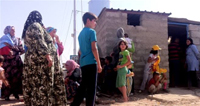Leishmaniasis cases recorded among Syrian refugees in Iraqi Domise camp
|
 |
|||
 Syrian refugees in Domise camp north of Iraq
Syrian refugees in Domise camp north of Iraq
Dohuk Health Directorate announced on Monday, July 15, that numerous cases of Cutaneous Leishmaniasis (Baghdad Boil) in Domise Camp for Syrian refugees, stressing that it is trying to limit infection cases and prevent the widespread of the disease.
“The medical center in Domise Camp recorded in the previous days about 16 cases of Leishmaniasis (Baghdad Boil)”, said Dohuk Health Directorate Commissioner, Bikhtiyar Ahmad Rashid in a statement to Alsumaria. He revealed that “relevant authorities implemented tight measures to prevent the wide spread of this disease”.
“We have provided the necessary drugs and medical equipment to treat the camp residents”, added Rashid, highlighting that “the medical unit in the camp will follow-up on the patients situation and make sure it’s under control”.
Cutaneous Leishmaniasis (Baghdad Boil) is a skin disease spread in different regions of the world and caused by 20 different Leishmania parasites capable of causing an infection in the human body. This infection is transferred to humans through a bite from the phlobotominae (sandfly) insect family.
The High Commission for Refugees announced in the beginning of April that crowdedness and high temperature increase the possibility of spreading diseases and creating tension among camp residents. It highlighted that the situation in Domise camp for Syrian refugees north of Iraq is quite alarming.


